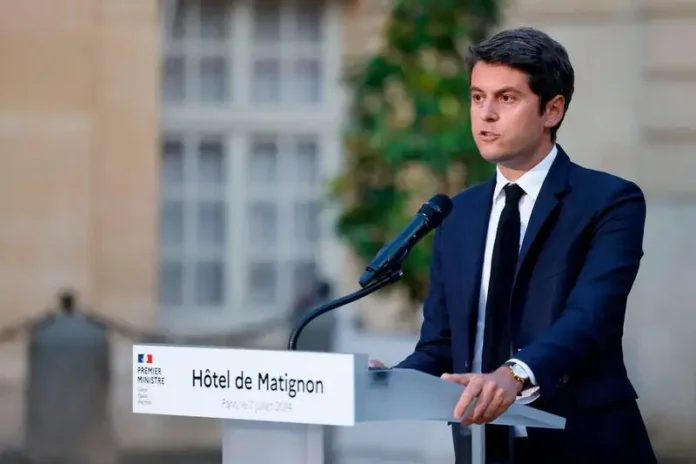
Paris, France – In a dramatic turn of events, French President Emmanuel Macron has refused the resignation of Prime Minister Gabriel Attal, asking him to remain temporarily as the head of the government.
The decision comes after chaotic election results on Sunday left France in a political limbo, with no faction securing a majority in the National Assembly.
The legislative elections, which saw a large voter turnout, split the legislature across the left, center, and far right. This division has raised the risk of governmental paralysis for France, the European Union’s second-largest economy.
Macron’s gamble on calling snap elections for what he termed a “moment of clarification” backfired, creating more uncertainty just weeks before the Paris Olympics.
Despite the initial dip, the French stock market recovered quickly on Monday. Analysts suggest that markets had anticipated a worse outcome, fearing an outright victory for either the far-right or the leftist coalition.
Prime Minister Attal, who had indicated he would stay in office if necessary, tendered his resignation on Monday morning. However, Macron immediately requested that he continue “to ensure the stability of the country.”
This meeting, attended by Macron’s top political allies, lasted about 90 minutes at the presidential palace.
The election results have made it difficult for any single bloc to form a government. The New Popular Front leftist coalition emerged as the leading faction with over 180 seats, followed by Macron’s centrist alliance with more than 160 seats.
The far-right National Rally, led by Marine Le Pen, secured over 140 seats, a significant increase from its previous best showing of 89 seats in 2022. All three blocs fell far short of the 289 seats needed to control the 577-seat National Assembly.
Macron has three years left in his presidential term, during which he now faces significant challenges. The recent elections highlighted widespread public discontent over inflation, crime, immigration, and other grievances, reflecting dissatisfaction with Macron’s style of governance.
The New Popular Front has already called on Macron to allow them the first chance to form a government and propose a prime minister. The coalition, which aims to reverse many of Macron’s key reforms and increase public spending, has also signaled a tougher stance on Israel amid its conflict with Hamas.
However, the internal dynamics of the leftist coalition make it unclear who could lead the government without alienating crucial allies.
“We need someone who offers consensus,” said Olivier Faure, head of the Socialist Party, which is part of the leftist coalition. The coalition was still determining its exact number of seats as of Monday.
The political deadlock could have significant implications for global diplomacy, the war in Ukraine, and Europe’s economic stability. Macron’s upcoming participation in the NATO summit in Washington adds another layer of complexity to the current situation.
Despite the uncertainty, at least one international leader expressed a positive outlook. “In Paris enthusiasm, in Moscow disappointment, in Kyiv relief.
Enough to be happy in Warsaw,” tweeted Polish Prime Minister Donald Tusk, a former European Union Council head, reflecting the geopolitical reverberations of France’s election results.
As newly elected and returning lawmakers prepare to gather at the National Assembly for negotiations, France finds itself at a critical juncture, with its political future hanging in the balance.
This article was created using automation technology and was thoroughly edited and fact-checked by one of our editorial staff members